When the World Shook (11)
By:
May 18, 2012
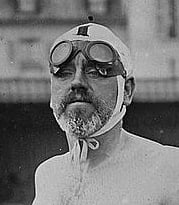
HILOBROW is pleased to present the eleventh installment of our serialization of H. Rider Haggard’s When the World Shook. New installments will appear each Friday for 24 weeks.
Marooned on a South Sea island, Humphrey Arbuthnot and his friends awaken the last two members of an advanced race, who have spent 250,000 years in a state of suspended animation. Using astral projection, Lord Oro visits London and the battlefields of the Western Front; horrified by the degraded state of modern civilization, he activates chthonic technology capable of obliterating it. Will Oro’s beautiful daughter, Yva, who has fallen in love with Humphrey, stop him in time?
“If this is pulp fiction it’s high pulp: a Wagnerian opera of an adventure tale, a B-movie humanist apocalypse and chivalric romance,” says Lydia Millet in a blurb written for HiLoBooks. “When the World Shook has it all — English gentlemen of leisure, a devastating shipwreck, a volcanic tropical island inhabited by cannibals, an ancient princess risen from the grave, and if that weren’t enough a friendly, ongoing debate between a godless materialist and a devout Christian. H. Rider Haggard’s rich universe is both profoundly camp and deeply idealistic.”
Haggard’s only science fiction novel was first published in 1919. In September 2012, HiLoBooks will publish a beautiful new edition of When the World Shook, with an introduction by Atlantic Monthly contributing editor James Parker. NOW AVAILABLE FOR PRE-ORDERING!
SUBSCRIBE to HILOBROW’s serialized fiction via RSS.
LAST WEEK: “‘I don’t know what to think of it,’ he said; ‘but as the experience is not natural and everything in the Universe, so far as we know it, has a natural explanation, I am inclined to the belief that we are suffering from hallucinations, which in their way are also quite natural. It does not seem possible that two people can really have been asleep for an unknown length of time enclosed in vessels of glass or crystal, kept warm by radium or some such substance, and then emerge from them comparatively strong and well. It is contrary to natural law.'”
ALL EXCERPTS: 1 | 2 | 3 | 4 | 5 | 6 | 7 | 8 | 9 | 10 | 11 | 12 | 13 | 14 | 15 | 16 | 17 | 18 | 19 | 20 | 21 | 22 | 23 | 24
By the time that we got back to camp it was drawing towards evening, so we cooked our food and ate, and then, thoroughly exhausted, made ourselves as comfortable as we could and went to sleep. Even our marvelous experiences could not keep Bickley and myself from sleeping, and on Bastin such things had no effect. He accepted them and that was all, much more readily than we did, indeed. Triple-armed as he was in the mail of a child-like faith, he snapped his fingers at evil spirits which he supposed the Sleepers to be, and at everything else that other men might dread.
Now, as I have mentioned, after our talk with Marama, although we did not think it wise to adventure ourselves among them again at present, we had lost all fear of the Orofenans. In this attitude, so far as Marama himself and the majority of his people were concerned, we were quite justified, for they were our warm friends. But in the case of the sorcerers, the priests and all their rascally and superstitious brotherhood, we were by no means justified. They had not forgiven Bastin his sacrilege or for his undermining of their authority by the preaching of new doctrines which, if adopted, would destroy them as a hierarchy. Nor had they forgiven Bickley for shooting one of their number, or any of us for our escape from the vengeance of their god.
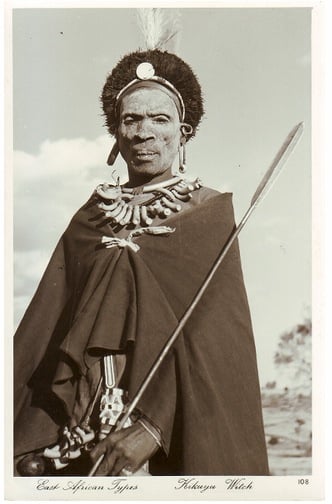
So it came about that they made a plot to seize us all and hale us off to be sacrificed to a substituted image of Oro, which by now they had set up. They knew exactly where we slept upon the rock; indeed, our fire showed it to them and so far they were not afraid to venture, since here they had been accustomed for generations to lay their offerings to the god of the Mountain. Secretly on the previous night, without the knowledge of Marama, they had carried two more canoes to the borders of the lake. Now on this night, just as the moon was setting about three in the morning, they made their attack, twenty-one men in all, for the three canoes were large, relying on the following darkness to get us away and convey us to the place of sacrifice to be offered up at dawn and before Marama could interfere.
The first we knew of the matter, for most foolishly we had neglected to keep a watch, was the unpleasant sensation of brawny savages kneeling on us and trussing us up with palm-fibre ropes. Also they thrust handfuls of dry grass into our mouths to prevent us from calling out, although as air came through the interstices of the grass, we did not suffocate. The thing was so well done that we never struck a blow in self-defence, and although we had our pistols at hand, much less could we fire a shot. Of course, we struggled as well as we were able, but it was quite useless; in three minutes we were as helpless as calves in a net and like calves were being conveyed to the butcher. Bastin managed to get the gag out of his mouth for a few seconds, and I heard him say in his slow, heavy voice:
“This, Bickley, is what comes of trafficking with evil spirits in museum cases —” There his speech stopped, for the grass wad was jammed down his throat again, but distinctly I heard the inarticulate Bickley snort as he conceived the repartee he was unable to utter. As for myself, I reflected that the business served us right for not keeping a watch, and abandoned the issue to fate.
Still, to confess the truth, I was infinitely more sorry to die than I should have been forty-eight hours earlier. This is a dull and in most ways a dreadful world, one, if we could only summon the courage, that some of us would be glad to leave in search of new adventures. But here a great and unprecedented adventure had begun to befall me, and before its mystery was solved, before even I could formulate a theory concerning it, my body must be destroyed, and my intelligence that was caged therein, sent far afield; or, if Bickley were right, eclipsed. It seemed so sad just when the impossible, like an unguessed wandering moon, had risen over the grey flats of the ascertained and made them shine with hope and wonder.
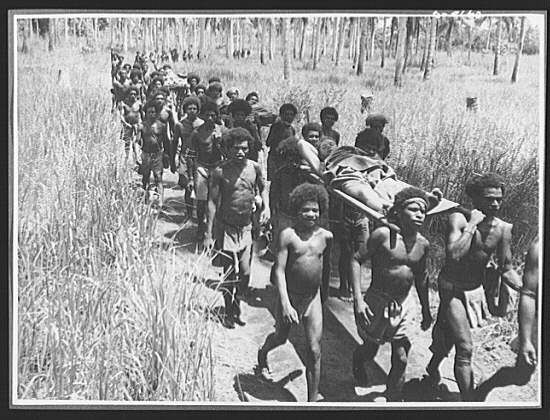
They carried us off to the canoes, not too gently; indeed, I heard the bony frame of Bastin bump into the bottom of one of them and reflected, not without venom, that it served him right as he was the fount and origin of our woes. Two stinking magicians, wearing on their heads undress editions of their court cages, since these were too cumbersome for active work of the sort, and painted all over with various pigments, were just about to swing me after him into the same, or another canoe, when something happened. I did not know what it was, but as a result, my captors left hold of me so that I fell to the rock, lying upon my back.
Then, within my line of vision, which, it must be remembered, was limited because I could not lift my head, appeared the upper part of the tall person of the Ancient who said that he was named Oro. I could only see him down to his middle, but I noted vaguely that he seemed to be much changed. For instance, he wore a different coloured dress, or rather robe; this time it was dark blue, which caused me to wonder where on earth it came from. Also, his tremendous beard had been trimmed and dressed, and on his head there was a simple black cap, strangely quilted, which looked as though it were made of velvet. Moreover, his face had plumped out. He still looked ancient, it is true, and unutterably wise, but now he resembled an antique youth, so great were his energy and vigour. Also, his dark and glowing eyes shone with a fearful intensity. In short, he seemed impressive and terrible almost beyond imagining.
He looked about him slowly, then asked in a deep, cold voice, speaking in the Orofenan tongue:
“What do you, slaves?”
No one seemed able to answer, they were too horror-stricken at this sudden vision of their fabled god, whose fierce features of wood had become flesh; they only turned to fly. He waved his thin hand and they came to a standstill, like animals which have reached the end of their tether and are checked by the chains that bind them. There they stood in all sorts of postures, immovable and looking extremely ridiculous in their paint and feathers, with dread unutterable stamped upon their evil faces.
The Sleeper spoke again:
“You would murder as did your forefathers, O children of snakes and hogs fashioned in the shape of men. You would sacrifice those who dwell in my shadow to satisfy your hate because they are wiser than you. Come hither thou,” and he beckoned with a bony finger to the chief magician.

The man advanced towards him in short jumps, as a mechanical toy might do, and stood before him, his miniature crate and feathers all awry and the sweat of terror melting the paint in streaks upon his face.
“Look into the eyes of Oro, O worshipper of Oro,” said the Sleeper, and he obeyed, his own eyes starting out of his head.
“Receive the curse of Oro,” said the Ancient again.
Then followed a terrible spectacle. The man went raving mad. He bounded into the air to a height inconceivable. He threw himself upon the ground and rolled upon the rock. He rose again and staggered round and round, tearing pieces out of his arms with his teeth. He yelled hideously like one possessed. He grovelled, beating his forehead against the rock. Then he sat up, slowly choked and — died.
His companions seemed to catch the infection of death as terrified savages often do. They too performed dreadful antics, all except three of them who stood paralysed. They rushed about battering each other with their fists and wooden weapons, looking like devils from hell in their hideous painted attire. They grappled and fought furiously. They separated and plunged into the lake, where with a last grimace they sank like stones.
It seemed to last a long while, but I think that as a matter of fact within five minutes it was over; they were all dead. Only the three paralysed ones remained standing and rolling their eyes.
The Sleeper beckoned to them with his thin finger, and they walked forward in step like soldiers.
“Lift that man from the boat,” he said, pointing to Bastin, “cut his bonds and those of the others.”
They obeyed with a wonderful alacrity. In a minute we stood at liberty and were pulling the grass gags from our mouths. The Ancient pointed to the head magician who lay dead upon the rock, his hideous, contorted countenance staring open-eyed at heaven.
“Take that sorcerer and show him to the other sorcerers yonder,” he said, “and tell them where your fellows are if they would find them. Know by these signs that the Oro, god of the Mountain, who has slept a while, is awake, and ill will it go with them who question his power or dare to try to harm those who dwell in his house. Bring food day by day and await commands. Begone!”
The dreadful-looking body was bundled into one of the canoes, that out of which Bastin had emerged. A rower sprang into each of them and presently was paddling as he had never done before. As the setting moon vanished, they vanished with it, and once more there was a great silence.
“I am going to find my boots,” said Bastin. “This rock is hard and I hurt my feet kicking at those poor fellows who appear to have come to a bad end, how, I do not exactly understand. Personally, I think that more allowances should have been made for them, as I hope will be the case elsewhere, since after all they only acted according to their lights.”
“Curse their lights!” ejaculated Bickley, feeling his throat which was bruised. “I’m glad they are out.”
Bastin limped away in search of his boots, but Bickley and I stood where we were contemplating the awakened Sleeper. All recollection of the recent tumultuous scene seemed to have passed from his mind, for he was engaged in a study of the heavens. They were wonderfully brilliant now that the moon was down, brilliant as they only can be in the tropics when the sky is clear.
Something caused me to look round, and there, coming towards us, was she who said her name was Yva. Evidently all her weakness had departed also, for now she needed no support, but walked with a peculiar gliding motion that reminded me of a swan floating forward on the water. Well had we named her the Glittering Lady, for in the starlight literally she seemed to glitter. I suppose the effect came from her golden raiment, which, however, I noticed, as in her father’s case, was not the same that she had worn in the coffin; also from her hair that seemed to give out a light of its own. At least, she shimmered as she came, her tall shape swaying at every step like a willow in the wind. She drew near, and I saw that her face, too, had filled out and now was that of one in perfect health and vigour, while her eyes shone softly and seemed wondrous large.
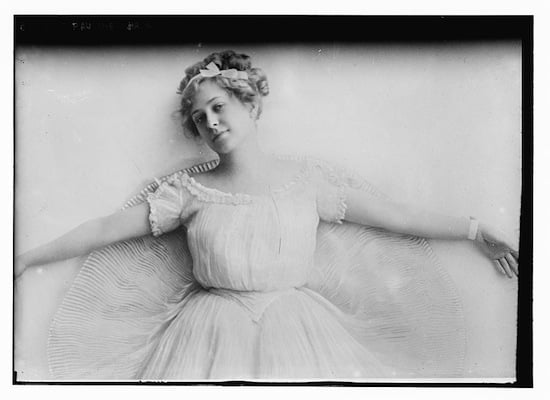
In her hands she carried those two plates of metal which I had seen lying in the coffin of the Sleeper Oro. These she gave to him, then fell back out of his hearing — if it were ever possible to do this, a point on which I am not sure — and began to talk to me. I noted at once that in the few hours during which she was absent, her knowledge of the Orofenan tongue seemed to have improved greatly as though she had drunk deeply from some hidden fount of memory. Now she spoke it with readiness, as Oro had done when he addressed the sorcerers, although many of the words she used were not known to me, and the general form of her language appeared archaic, as for instance that of Spenser is compared with modern English. When she saw I did not comprehend her, however, she would stop and cast her sentences in a different shape, till at length I caught her meaning. Now I give the substance of what she said.
“You are safe,” she began, glancing first at the palm ropes that lay upon the rock and then at my wrists, one of which was cut.
“Yes, Lady Yva, thanks to your father.”
“You should say thanks to me. My father was thinking of other things, but I was thinking of you strangers, and from where I was I saw those wicked ones coming to kill you.”
“Oh! from the top of the mountain, I suppose.”
She shook her head and smiled but vouchsafed no further explanation, unless her following words can be so called. These were:
“I can see otherwise than with my eyes, if I choose.” A statement that caused Bickley, who was listening, to mutter:
“Impossible! What the deuce can she mean? Telepathy, perhaps.”
“I saw,” she continued, “and told the Lord, my father. He came forth. Did he kill them? I did not look to learn.”
“Yes. They lie in the lake, all except three whom he sent away as messengers.”
“I thought so. Death is terrible, O Humphrey, but it is a sword which those who rule must use to smite the wicked and the savage.”
Not wishing to pursue this subject, I asked her what her father was doing with the metal plates.
“He reads the stars,” she answered, “to learn how long we have been asleep. Before we went to sleep he made two pictures of them, as they were then and as they should be at the time he had set for our awakening.”
“We set that time,” interrupted Bickley.
“Not so, O Bickley,” she answered, smiling again. “In the divine Oro’s head was the time set. You were the hand that executed his decree.”
When Bickley heard this I really thought he would have burst. However, he controlled himself nobly, being anxious to hear the end of this mysterious fib.
“How long was the time that the lord Oro set apart for sleep?” I asked.
She paused as though puzzled to find words to express her meaning, then held up her hands and said:
“Ten,” nodding at her fingers. By second thoughts she took Bickley’s hands, not mine, and counted his ten fingers.
“Ten years,” said Bickley. “Well, of course, it is impossible, but perhaps —” and he paused.
“Ten tens,” she went on with a deepening smile, “one hundred.”
“O!” said Bickley.
“Ten hundreds, one thousand.”
“I say!” said Bickley.
“Ten times ten thousand, one hundred thousand.”
Bickley became silent.
“Twice one hundred thousand and half a hundred thousand, two hundred and fifty thousand years. That was the space of time which the lord Oro, my father, set for our sleep. Whether it has been fulfilled he will know presently when he has read the book of the stars and made comparison of it with what he wrote before we laid us down to rest,” and she pointed to the metal plates which the Ancient was studying.
Bickley walked away, making sounds as though he were going to be ill and looking so absurd in his indignation that I nearly laughed. The Lady Yva actually did laugh, and very musical was that laugh.
“He does not believe,” she said. “He is so clever he knows everything. But two hundred and fifty thousand years ago we should have thought him quite stupid. Then we could read the stars and calculate their movements for ever.”
“So can we,” I answered, rather nettled.
“I am glad, O Humphrey, since you will be able to show my father if in one of them he is wrong.”
Secretly I hoped that this task would not be laid on me. Indeed, I thought it well to change the subject for the edification of Bickley who had recovered and was drawn back by his eager curiosity. Just then, too, Bastin joined us, happy in his regained boots.
“You tell us, Lady Yva,” I said, “that you slept, or should have slept for two hundred and fifty thousand years.” Here Bastin opened his eyes. “If that was so, where was your mind all this time?”
“If by my mind you mean spirit, O Humphrey, I have to answer that at present I do not know for certain. I think, however, that it dwelt elsewhere, perhaps in other bodies on the earth, or some different earth. At least, I know that my heart is very full of memories which as yet I cannot unroll and read.”
“Great heavens, this is madness!” said Bickley.
“In the great heavens,” she answered slowly, “there are many things which you, poor man, would think to be madness, but yet are truth and perfect wisdom. These things, or some of them, soon I shall hope to show you.”
“Do if you can,” said Bickley.
“Why not?” interrupted Bastin. “I think the lady’s remarks quite reasonable. It seems to me highly improbable if really she has slept for two hundred and fifty thousand years, which, of course, I can’t decide, that an immortal spirit would be allowed to remain idle for so long. That would be wallowing in a bed of idleness and shirking its duty which is to do its work. Also, as she tells you, Bickley, you are not half so clever as you think you are in your silly scepticism, and I have no doubt that there are many things in other worlds which would expose your ignorance, if only you could see them.”
At this moment Oro turned and called his daughter. She went at once, saying:
“Come, strangers, and you shall learn.”
So we followed her.
“Daughter,” he said, speaking in Orofenan, I think that we might understand, “ask these strangers to bring one of those lamps of theirs that by the light of it I may study these writings.”
“Perhaps this may serve,” said Bickley, suddenly producing an electric torch from his pocket and flashing it into his face. It was his form of repartee for all he had suffered at the hands of this incomprehensible pair. Let me say at once that it was singularly successful. Perhaps the wisdom of the ages in which Oro flourished had overlooked so small a matter as electric torches, or perhaps he did not expect to meet with them in these degenerate days. At any rate for the first and last time in my intercourse with him I saw the god, or lord — the native word bears either meaning —Oro genuinely astonished. He started and stepped back, and for a moment or two seemed a little frightened. Then muttering something as to the cleverness of this light-producing instrument, he motioned to his daughter to take it from Bickley and hold it in a certain position. She obeyed, and in its illumination he began to study the engraved plates, holding one of them in either hand.
After a while he gave me one of the plates to hold, and with his disengaged hand pointed successively to the constellation of Orion, to the stars Castor, Pollux, Aldebaran, Rigel, the Pleiades, Sirius and others which with my very limited knowledge I could not recognise offhand. Then on the plate which I held, he showed us those same stars and constellations, checking them one by one.
Then he remarked very quietly that all was in order, and handing the plate he held to Yva, said:
“The calculations made so long ago are correct, nor have the stars varied in their proper motions during what is after all but an hour of time. If you, Stranger, who, I understand, are named Humphrey, should be, as I gather, a heaven-master, naturally you will ask me how I could fix an exact date by the stars without an error of, let us say, from five to ten thousand years. I answer you that by the proper motion of the stars alone it would have been difficult. Therefore I remember that in order to be exact, I calculated the future conjunctions of those two planets,” and he pointed to Saturn and Jupiter. “Finding that one of these occurred near yonder star,” and he indicated the bright orb, Spica, “at a certain time, I determined that then I would awake. Behold! There are the stars as I engraved them from my foreknowledge, upon this chart, and there those two great planets hang in conjunction. Daughter Yva, my wisdom has not failed me. This world of ours has travelled round the sun neither less nor more than two hundred and fifty thousand times since we laid ourselves down to sleep. It is written here, and yonder,” and he pointed, first to the engraved plates and then to the vast expanse of the starlit heavens.
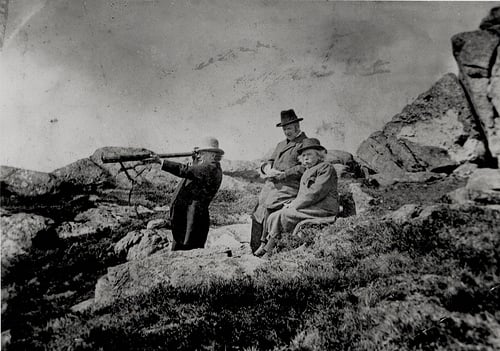
Awe fell on me; I think that even Bickley and Bastin were awed, at any rate for the moment. It was a terrible thing to look on a being, to all appearance more or less human, who alleged that he had been asleep for two hundred and fifty thousand years, and proceeded to prove it by certain ancient star charts. Of course at the time I could not check those charts, lacking the necessary knowledge, but I have done so since and found that they are quite accurate. However this made no difference, since the circumstances and something in his manner convinced me that he spoke the absolute truth.
He and his daughter had been asleep for two hundred and fifty thousand years. Oh! Heavens, for two hundred and fifty thousand years!
ORO SPEAKS AND BASTIN ARGUES
The reader of what I have written, should there ever be such a person, may find the record marvelous, and therefore rashly conclude that because it is beyond experience, it could not be. It is not a wise deduction, as I think Bickley would admit today, because without doubt many things are which surpass our extremely limited experience. However, those who draw the veil from the Unknown and reveal the New, must expect incredulity, and accept it without grumbling. Was that not the fate, for instance, of those who in the Middle Ages, a few hundred years ago, discovered, or rather rediscovered the mighty movements of those constellations which served Oro for an almanac?
But the point I want to make is that if the sceptic plays a Bickleyan part as regards what has been written, it seems probable that his attitude will be accentuated as regards that which it still remains for me to write. If so, I cannot help it, and must decline entirely to water down or doctor facts and thus pander to his prejudice and ignorance. For my part I cannot attempt to explain these occurrences; I only know that they happened and that I set down what I saw, heard and felt, neither more nor less.
Immediately after Oro had triumphantly vindicated his stellar calculations he turned and departed into the cave, followed by his daughter, waving to us to remain where we were. As she passed us, however, the Glittering Lady whispered — this time to Bastin — that he would see them again in a few hours, adding:
“We have much to learn and I hope that then you who, I understand, are a priest, will begin to teach us of your religion and other matters.”
Bastin was so astonished that he could make no reply, but when they had gone he said:
“Which of you told her that I was a priest?”
We shook our heads for neither of us could remember having done so.
“Well, I did not,” continued Bastin, “since at present I have found no opportunity of saying a word in season. So I suppose she must have gathered it from my attire, though as a matter of fact I haven’t been wearing a collar, and those men who wanted to cook me, pulled off my white tie and I didn’t think it worth while dirtying a clean one.”
“If,” said Bickley, “you imagine that you look like the minister of any religion ancient or modern in a grubby flannel shirt, a battered sun-helmet, a torn green and white umbrella and a pair of ragged duck trousers, you are mistaken, Bastin, that is all.”
“I admit that the costume is not appropriate, Bickley, but how otherwise could she have learned the truth?”
“These people seem to have ways of learning a good many things. But in your case, Bastin, the cause is clear enough. You have been walking about with the head of that idol and always keep it close to you. No doubt they believe that you are a priest of the worship of the god of the Grove —Baal, you know, or something of that sort.”
When he heard this Bastin’s face became a perfect picture. Never before did I see it so full of horror struggling with indignation.
“I must undeceive them without a moment’s delay,” he said, and was starting for the cave when we caught his arms and held him.
“Better wait till they come back, old fellow,” I said, laughing. “If you disobey that Lord Oro you may meet with another experience in the sacrifice line.”
“Perhaps you are right, Arbuthnot. I will occupy the interval in preparing a suitable address.”
“Much better occupy it in preparing breakfast,” said Bickley. “I have always noticed that you are at your best extempore.”
In the end he did prepare breakfast though in a distrait fashion; indeed I found him beginning to make tea in the frying-pan. Bastin felt that his opportunity had arrived, and was making ready to rise to the occasion.
Also we felt, all three of us, that we were extremely shabby-looking objects, and though none of us said so, each did his best to improve his personal appearance. First of all Bickley cut Bastin’s and my hair, after which I did him the same service. Then Bickley who was normally clean shaven, set to work to remove a beard of about a week’s growth, and I who wore one of the pointed variety, trimmed up mine as best I could with the help of a hand-glass. Bastin, too, performed on his which was of the square and rather ragged type, wisely rejecting Bickley’s advice to shave it off altogether, offered, I felt convinced, because he felt that the result on Bastin would be too hideous for words. After this we cut our nails, cleaned our teeth and bathed; I even caught Bickley applying hair tonic from his dressing case in secret, behind a projecting rock, and borrowed some myself. He gave it me on condition that I did not mention its existence to Bastin who, he remarked, would certainly use the lot and make himself smell horrible.
Next we found clean ducks among our store of spare clothes, for the Orofenans had brought these with our other possessions, and put them on, even adding silk cumberbunds and neckties. My tie I fastened with a pin that I had obtained in Egypt. It was a tiny gold statuette of very fine and early workmanship, of the god Osiris, wearing the crown of the Upper Land with the uræus crest, and holding in his hands, which projected from the mummy wrappings, the emblems of the crook, the scourge and the crux ansata, or Sign of Life.
Bastin, for his part, arrayed himself in full clerical costume, black coat and trousers, white tie and stick-up clergyman’s collar which, as he remarked, made him feel extremely hot in that climate, and were unsuitable to domestic duties, such as washing-up. I offered to hold his coat while he did this office and told him he looked very nice indeed.
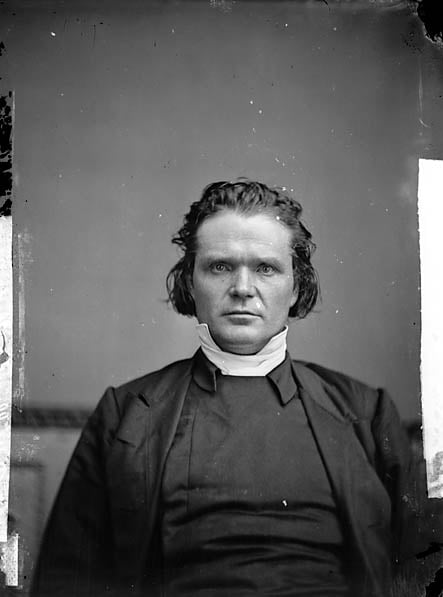
“Beautiful!” remarked Bickley, “but why don’t you put on your surplice and biretta?” (Being very High-Church Bastin did wear a biretta on festival Sundays at home.) “There would be no mistake about you then.”
“I do not think it would be suitable,” replied Bastin whose sense of humour was undeveloped. “There is no service to be performed at present and no church, though perhaps that cave —” and he stopped.
When we had finished these vain adornments and Bastin had put away the things and tidied up, we sat down, rather at a loose end. We should have liked to walk but refrained from doing so for fear lest we might dirty our clean clothes. So we just sat and thought. At least Bickley thought, and so did I for a while until I gave it up. What was the use of thinking, seeing that we were face to face with circumstances which baffled reason and beggared all recorded human experience? What Bastin did I am sure I do not know, but I think from the expression of his countenance that he was engaged in composing sermons for the benefit of Oro and the Glittering Lady.
NEXT WEEK: “‘I am a king who once ruled most of the world as it was in my day, though it is true that much of it rebelled against me, my councillors and servants. Therefore I destroyed the world as it was then, save only certain portions whence life might spread to the new countries that I raised up. Having done this I put myself and my daughter to sleep for a space of two hundred and fifty thousand years, that there might be time for fresh civilisations to arise.'”
RADIUM AGE SCIENCE FICTION: “Radium Age” is HILOBROW’s name for the 1904–33 era, which saw the discovery of radioactivity, the revelation that matter itself is constantly in movement — a fitting metaphor for the first decades of the 20th century, during which old scientific, religious, political, and social certainties were shattered. This era also saw the publication of genre-shattering writing by Edgar Rice Burroughs, Sax Rohmer, E.E. “Doc” Smith, Jack London, Arthur Conan Doyle, Aldous Huxley, Olaf Stapledon, Karel Čapek, H.P. Lovecraft, Charlotte Perkins Gilman, Yevgeny Zamyatin, Philip Gordon Wylie, and other pioneers of post-Verne/Wells, pre-Golden Age “science fiction.” More info here.
HILOBOOKS: The mission of HiLoBooks is to serialize novels on HiLobrow; and also, as of 2012, operating as an imprint of Richard Nash’s Cursor, to reissue Radium Age science fiction in beautiful new print editions. So far, we have published Jack London’s The Scarlet Plague, Rudyard Kipling’s With the Night Mail (and “As Easy as A.B.C.”), Arthur Conan Doyle’s The Poison Belt, H. Rider Haggard’s When the World Shook, Edward Shanks’s The People of the Ruins, William Hope Hodgson’s The Night Land, and J.D. Beresford’s Goslings. Forthcoming: E.V. Odle’s The Clockwork Man, Cicely Hamilton’s Theodore Savage, and Muriel Jaeger’s The Man with Six Senses. For more information, visit the HiLoBooks homepage.
READ: You are reading H. Rider Haggard’s When The World Shook. Also read our serialization of: Jack London’s The Scarlet Plague | Rudyard Kipling’s With the Night Mail and “As Easy As A.B.C.” | Arthur Conan Doyle’s The Poison Belt
ORIGINAL FICTION: HILOBROW has serialized three novels: James Parker’s The Ballad of Cocky The Fox (“a proof-of-concept that serialization can work on the Internet” — The Atlantic) and Karinne Keithley Syers’s Linda Linda Linda. We also publish original stories and comics.
